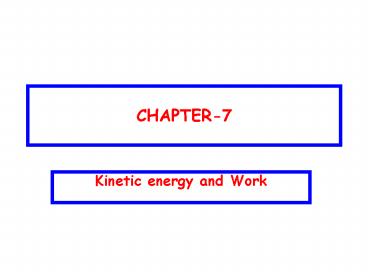Kinetic energy and Work
1 / 14
Title: Kinetic energy and Work
1
CHAPTER-7
- Kinetic energy and Work
2
Ch 7-2,3 Kinetic Energy
- Energy a scalar quantity associated with state
or condition of one or more objects - Kinetic Energy (K) energy associated with state
of motion of an object. The faster an object
moves, greater is its K - Kmv2/2
- Unit of energy (K or any type of energy) is joule
(J) - 1J1 kg. m2/s2
3
Ch 7-4 Work
- Work W is energy transferred to or from an object
by means of a force acting on the object. - If the object is accelerated by applying a force,
its kinetic energy K increases. Energy
transferred to the object is positive work W. - If you decelerate the object by applying a force,
you decrease its kinetic energy K. Energy
transferred from the object is negative work -W.
4
Ch 7-5 Work and Kinetic Energy
- Work done in accelerating a bead through a
distance d along x-axis under a constant force F
acting at an angle ? with respect to x-axis - W ?K m(v2-v02)/2 but
- axd(v2-v02)/2
- W ?Km axdFxdFcos ? dF.d
- W FxdFcos ? dF.d
- Positive Work Displacement along force
direction - Negative Work Displacement opposite to force
direction
5
Ch 7-5 Work and Kinetic Energy
- Work-Kinetic Energy Theorem
- W ?K Kf-Ki m(v2-v02)/2
- Kf W Ki
- v2 2(WKi)/m
6
Ch 5-Check-Point-1
- A particle moves along x-axis. Does its kinetic
energy increase or decrease , or remain the same
if the particle velocity changes - a) from -3 m/s to -2 m/s
- b) -2 m/s to 2 m/s
- c) in each situation the work done on the
particle is positive, negative or zero?
- ?K m(vf2-vi2)/2
- a) ?K m(vf2-vi2)/2
- m/2(4-9)-5m/2
- ?K is negative
- b) ?K m(vf2-vi2)/2
- m(4-4)/20
- ?K is constant
- c) W is negative
- W is Zero
7
Ch 5-Check-Point-2
The figure show four situation in which a box
acts on a box while the box slides rightward a
distance d across a frictionless floor. The
magnitude of the forces is identical their
orientation are as shown. Rank the situation
according to the work done on the box during the
displacement, most positive first
W Fdcos? d) W Fd c) WFdcos? b) W 0 a) W
- Fdcos?
8
Ch 7-6 Work Done by Gravitational Force
(Constant Force)
- A tomato, thrown upward, is slowed down from
initial velocity v0 to v under the effect of
gravitational force Fg - Work Wg done by the gravitational force Fg in
rising objects - WgFgd cos ?mgd cos ? mgd (-1) - mgd
- Work Wg done by the gravitational force Fg in
falling objects - WgFgd cos ?mgd cos ? mgd (1) mgd
9
Work done in lifting and objects
- Work Wa done by an applied force F in lifting /
lowering an object through a distance d - ?K Kf-Ki Wa Wg
- In lifting object is at rest in initial and final
position - ?K Kf-Ki 0 then
- Wa - Wg -mg d cos?
- Lifting ? 180
- Lowering ? 0
10
Ch 7-7 Work done by a spring Force- (Variable
Force)
- Relaxed state of a spring ( Fig. a) Spring
neither compressed nor extended - Spring Fore Fx (Restoring Forces) acts to restore
the spring to its relaxed state - Fx-kx (Hookes Law)
- where k is spring constant ( force constant) and
x is compression or extension in the relaxed
length of the spring - -ve Fx for ve value of x
- ve Fx for -ve value of x
11
Ch 7-7 Work done by a spring Force (Variable
Force)
- Work done by a spring force Ws
- Ws?xixfFx dx ?xixf(-kx) dx k(xi2-xf2)/2
- Ws -kx2/2 (if xi0 and xfx)
- Work done by an applied force Wa in
stretching/compressing a spring - ?K WaWs
- If the block is initially and finally at rest
- then ?K 0 and
- Wa - Ws
12
Ch 5-Check-Point-4
For three situations the initial and final
position respectively , along x-axis for the
block is a) -3 cm, 2cm b) 2 cm, 3 cm c) -2 cm, 2
cm. In each situation the work done by the spring
force on the block is positive, negative , or
zero.
- Work done by spring force is
- Wsk(xi2-xf2)/2
- Ws k(9-4)/25k/2 J
- Ws k(4-9)/2-5k/2 J
- Ws k(4-4)/20 J
13
Ch 7-8 Work done by a General Variable Force
- W ?xixfFx dx
- Work done by a variable force is equal to area
between F(x) curve and the x-axis , between the
limits xi and xf - Work-Kinetic Enegy Theorem for a variable force
- ?K Kf-KiW ?xixfFx dx
14
Ch 7-9 Power
- Power P Time rate of doing work of a force
- Average Power Pavg W/?t
- Instantaneous Power P dW/dt d/dt (Fcos ? dx)
- P Fcos ? vF.v
- Unit of power 1 watt 1 W 1J/s































